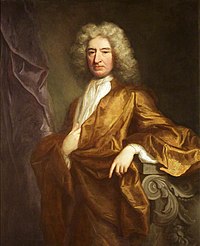爱德华·科尔斯顿
外观
| 爱德华·科尔斯顿 Edward Colston | |
|---|---|
 喬納森·理查德森所繪製的爱德华·科尔斯顿肖像 | |
| 布里斯托爾選區國會議員 | |
| 任期 1710年—1713年 | |
| 个人资料 | |
| 出生 | 1636年11月2日 英格蘭布里斯托尔 |
| 逝世 | 1721年10月11日(84歲) 英格蘭薩里郡摩特雷克 |
| 政党 | 托利党 |
| 职业 | 商人 |
爱德华·科尔斯顿(英語:Edward Colston,1636年11月2日—1721年10月11日)是一名英国商人、奴隶贩子、慈善家和保守党议员[1][2][3]:7-10。
科尔斯顿出生于布里斯托的商人家庭,後來其在伦敦建立了一家外贸企业,並在西班牙、葡萄牙和其他欧洲港口从事葡萄酒、水果和布料的贸易。1680年,科尔斯顿加入從事英國與非洲西海岸的黄金、象牙和奴隶贸易的皇家非洲公司,並於1689年至1690年擔任該公司的負責人[3][4][5]。
科尔斯顿離開皇家非洲公司後,开始進行放贷生意,并從事慈善活動,曾向布里斯托和伦敦的学校及医院捐款。他還擔任過布里斯托選區的保守黨國會議員。科尔斯顿臨終前,又将遗产赠予慈善机构[6]。
科尔斯顿去世後,布里斯托不少学校、音乐厅、写字楼和街道等皆以科尔斯顿名字命名。1895年,一座5.5米高的科爾斯頓青銅雕像在布里斯托科尔斯顿大道上落成[7]。
2020年5月26日,美国引发的乔治·弗洛伊德之死引发的示威活动之后,示威活动蔓延至欧洲地区,引发拆除历史争议人物雕像浪潮。科尔斯雕像被示威者拖到布里斯托港河中丢弃,之后英国当局将其打捞上来安置在博物馆。
参考文献
- ^ Ball, Roger. Myths within myths…Edward Colston and that statue. Bristol Radical History Group. 2018-10-14 [2020-06-10]. (原始内容存档于2020-06-07).
- ^ Cork, Tristan. The wording of second plaque proposed for Edward Colston statue linking him to 20,000 deaths. Bristol Live. Reach plc. 22 July 2018 [8 June 2020]. (原始内容存档于2019-03-30).
Bristolians who did not subscribe to his religious and political beliefs were not permitted to benefit from his charities
- ^ 3.0 3.1 Morgan, Kenneth. Edward Colston and Bristol (PDF). Bristol: Bristol Branch of the Historical Association. 1999: 3. (原始内容 (PDF)存档于8 June 2020).
- ^ Hayton, David. Colston, Edward II. The History of Parliament. 劍橋大學出版社. April 2006 [11 December 2017]. (原始内容存档于2020-06-12).
- ^ Dresser, Madge. Squares of distinction, webs of interest: Gentility, urban development and the slave trade in Bristol c.1673–1820. Slavery & Abolition a Journal of Slave and Post-Slave Studies (Routledge). 2000, 21 (3): 22. ISSN 1743-9523. doi:10.1080/01440390008575319. (原始内容存档于10 July 2011).
Some subsequent scholars have preferred to stress [...] his other commercial involvements -- in fruit and wines and cloth, and in West Indian sugar. Nevertheless, it is this last commercial interest which confirms that a significant part of his wealth was derived from the labour of slaves.
- ^ 聯合報. 趁亂的歷史正義?英國BLM抗爭推倒的「黑奴巨商銅像」. (原始内容存档于2020-06-09).
- ^ 界面新聞. 奴隶贩铜像被扔进河里:当年英国为何掺和非洲奴隶贸易?. (原始内容存档于2020-06-13).
